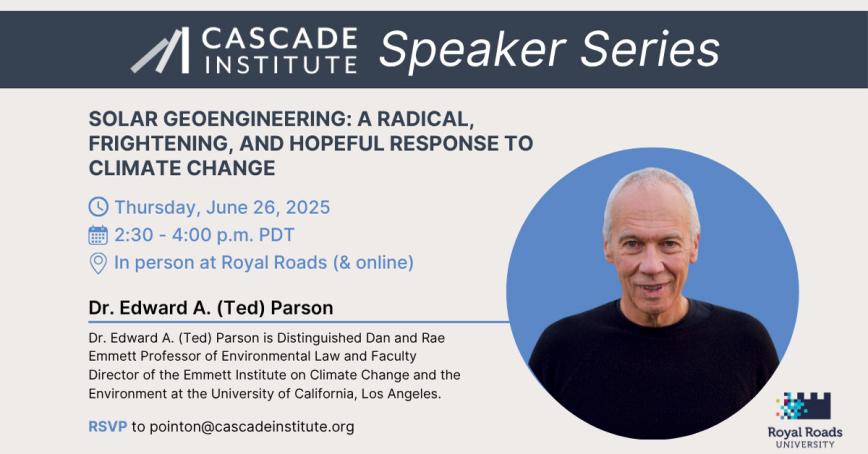Share online

Timezone: Pacific
Type: Info session
Delivery: In person
Address:
Centre for Dialogue (4th floor Sequoia Building)
Royal Roads University, 2005 Sooke Rd.
Colwood BC V9B 5Y2
Canada
Interested in attending?
Please note that you can also tune into the event online. RSVP for details.
About the topic
As near-term climate-change risks grow more severe and first-line responses continue to fall short, the prospect of adding solar geoengineering to set of responses is receiving increased attention and controversy. Solar geoengineering (also solar radiation modification, SRM) would actively change the Earth’s energy balance by scattering about one per cent of incoming sunlight, probably by spraying a fine mist of reflective liquid droplets in the stratosphere. Relative to other climate responses, solar geoengineering is fast, cheap, and imperfect.
Present research suggests it could temporarily reduce climate change and its most harmful impacts worldwide, with harmful side effects that are quite well understood and much smaller than the risks avoided. All its most serious problems pertain to how it would be used: how and how much, with what objectives, under whose control, and for how long with what exit strategy.
I will introduce the main SRM methods being considered, present knowledge of their expected effects, its major governance challenges and other concerns that have been raised, and possible pathways forward, with particular emphasis on implications for Canada.
About the speaker
Edward A. (Ted) Parson is Distinguished Dan and Rae Emmett Professor of Environmental Law and Faculty Director of the Emmett Institute on Climate Change and the Environment at the University of California, Los Angeles. Parson studies international environmental law and policy, the societal impacts and governance of disruptive technologies including geoengineering and artificial intelligence, and the political economy of regulation.
Parson leads the AI Pulse program at UCLA Law, and organized the 2019 Summer Institute on AI and Society. His articles have appeared in scientific and scholarly journals in a wide range of fields, including Science, Nature, Climatic Change, Future, Issues in Science and Technology, the Journal of Economic Literature, and the Annual Review of Environment and Resources.
His most recent books are The Science and Politics of Global Climate Change (with Andrew Dessler) (3rd ed. Cambridge, 2019), and A Subtle Balance: Evidence, Expertise, and Democracy in Public Policy and Governance, 1970-2010 (McGill-Queens University Press, 2015). His 2003 book, Protecting the Ozone Layer: Science and Strategy (Oxford), won the Sprout Award of the International Studies Association and is widely recognized as the authoritative account of the development of international cooperation to protect the ozone layer.RS
Parson has led and served on multiple advisory committees, for the National Academy of Sciences, the U.S. Global Change Research Program, and other national and international bodies. His work was influential in establishing the World Commission on Climate Overshoot, for which he serves as a senior advisor.
He was formerly Joseph L. Sax Collegiate Professor of Law and Professor of Natural Resources and Environment at the University of Michigan, and spent twelve years on the faculty of Harvard’s Kennedy School of Government. In addition to his academic positions, Parson has worked and consulted for the White House Office of Science and Technology Policy, the Office of Technology Assessment of the U.S. Congress, the Privy Council Office of the Government of Canada, and the International Institute for Applied Systems Analysis (IIASA).
He holds degrees in physics from the University of Toronto and in management science from the University of British Columbia, and a Ph.D. in Public Policy from Harvard. In former lives, he was a professional classical musician and an organizer of grass-roots environmental groups.